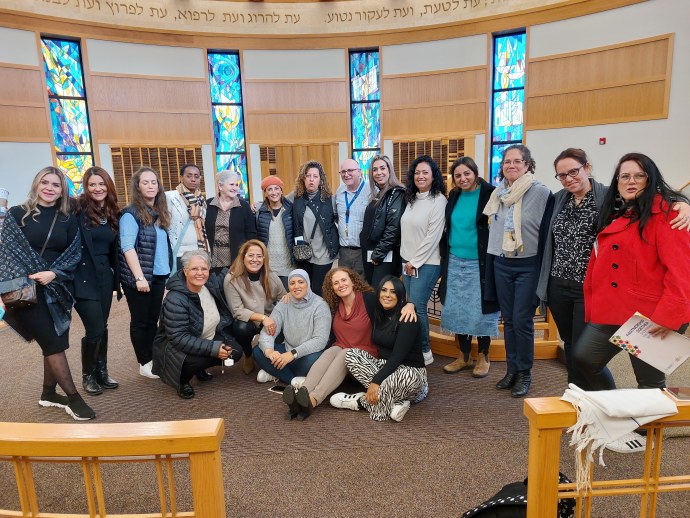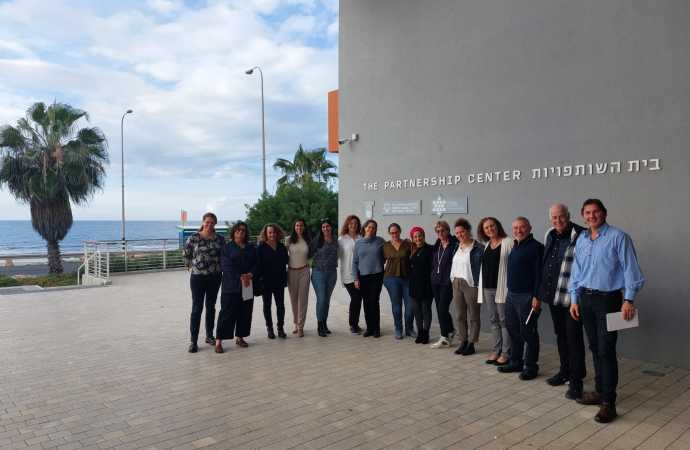The Jewish Agency’s Women Leading Dialogue initiative took its interfaith gatherings in Israel to the US, where they demonstrated to Jews, Muslims and Christians that conversations are the ultimate bridge-builder.
“There must be another way,” Noa and Mira Awad sang in their 2009 hit expressing a wish for peace between Jews and Palestinians. “And when I cry, I cry for both of us/My pain has no name/And when I cry, I cry to the merciless sky and say/There must be another way.”
The song, with its mixture of English, Hebrew, and Arabic lyrics, became the rallying cry for women who took part in “Women Leading Dialogue,” a Jewish Agency for Israel program operated by the Western Galilee Partnership and 17 Jewish Federations in the United States and The Jewish Agency in Hungary. It is part of The Jewish Agency’s Partnership2Gether (P2G) initiative, which connects 95 global Jewish communities with 70 local municipalities in Israel.

The program welcomes a mixture of Jewish, Christian, Druze, Muslim and Bedouin women, who desire to not only share their culture and religions within the group but to forge mutual understanding by having conversations that people are frequently conditioned to avoid.
Topics like identity, cultural belonging, and what it feels like to be part of a diverse society can be like walking a tightrope. However, the women navigated these sensitive subjects with laughter and grace, and when arguments arose – which they did – those discussions often concluded with tears and the feeling that disagreements brought them closer together, rather than drive a wedge between them.
The group concluded most of their meetings with the song of Noa and Miri Awad, enabling the melody and lyrics to release all the pent-up emotions that brewed through each conversation.

The women recently participated in a two-week program to the US, visiting Toledo, Ohio; South Bend, Indiana; Peoria, Springfield, Illinois; and Omaha, Nebraska. The local itineraries, organized by the Jewish Federation in each community, coordinated meetings with 1,500 community leaders, members from multifaith organizations and academic officials.
The Women Leading Dialogue initiative originated through the Young Adults Center of Mateh Asher, in the western Galilee of Northern Israel, which offered a cooking class to local women in the area from diverse cultural backgrounds. Unsurprisingly, organic conversations evolved around the stovetop. The Jewish Agency’s Western Galilee Partnership saw an opportunity to leverage these conversations into something more substantive with a detailed curriculum funded by the organization, the Thomas Foundation, the Julian Grace Foundation and the Jewish Federation of Omaha.
The program, now in its fourth cohort, met regularly over the course of a year, where the women not only learned about each other and their culture, but religious life in America as well. Before their trip, they became well-primed to explain their own lives and to ask thought-provoking questions in preparation for their meetings with people of all backgrounds in the US. The women also participated in programs and religious services at mosques, churches, and synagogues, across several denominations, in the United States.
‘Despite politics, we are connected as people first and foremost.
Safinaz Beromi, an Arab Israeli, felt the program was tailor-made for her. Born and raised in Akko, a port city in Northern Israel where Jews and Arabs live side by side and opportunities are not plentiful, Beromi prides herself on her unlikely trajectory to success. As a young Arab woman growing up in the periphery, Beromi understands that her path to becoming a lawyer and junior employee at the Ministry of Finance was an unlikely one.
Driven by her late father, who was a teacher, and her desire to empower women – especially underserved ones – is what intrigued her about the Women Leading Dialogue initiative.
“We were advised not to be ‘politically correct’ and say what we felt. We felt comfortable sharing our truths,” she said. “I feel confident to say that my origin is Palestinian. As part of the delegation, Arabs and Jews can and should discuss this freely. While visiting churches, synagogues, and mosques in the US, I felt proud to be Muslim and to be part of this group. It was such a privilege to share my story as a successful Palestinian woman among other cultures.”
Despite engaging in weighty subject matters, Dr. Iris Posklinsky, Northern District Partnership Director at The Jewish Agency and one of the facilitators of the program together with United States-based Partnership Consortium Director, Dr. Marcy L. Paul, stressed the program is apolitical.
The need to facilitate opportunities for conversation across communities is more vital than ever, and The Jewish Agency Chairman of the Executive Doron Almog echoed that sentiment after meeting with the cohort earlier this month.
“This program is an example of The Jewish Agency’s global impact, which sets to amplify the diversity of Israeli society, ensure all sectors of the country can connect on a meaningful level and foster long-lasting relationships with communities around the world,” he said. “After all, despite politics, we are connected as people first and foremost. Let’s try to dissolve tension between ourselves – politics is the downfall of most conversations.”
The program hopes to replicate its US success here in Israel. By gathering the three previous delegations, organizers are now working to set up meetings for the women where they will spread this messaging to local community and religious leaders across Israel, enabling Jews and Arabs in Israel to engage in meaningful dialogue that will encourage a ripple effect of positive change within their own communities.
Getting to know other women in her community beyond their religious or ethnic affiliation is what motivated Adi Yarimi Leibovich to join the delegation.
“I wanted to know who I was living with and who my neighbors were,” Leibovich, who lives in Kibbutz Matzuva in the Northern Galilee, said. Leibovich said she was fascinated by seeing how Jews and Muslims interact in the US since, unlike in Israel, they don’t have a dispute over land separating the two groups. “It’s unfortunate that Jews and Muslims in Israel have to travel so far to see that there is actually a lot that binds us together.”
“Jews and Muslims believe in one God; we pray in a similar way,” she said, adding that she was moved when she saw one of the Muslim women in the group visibly touched by the reading of Akeidat Yitzchak (the Binding of Isaac) since it was very similar to the account in the Koran, which states that Abraham bound Ishmael to be sacrificed, rather than Isaac.
“When you spend so much time with other women, you see we’re not so different. We all miss our families and worry about our children,” Leibovich agreed.
As a Jew, Leibovich also had the humbling experience of approaching the Bimah, the raised platform in the synagogue, and reading from the Torah for the first time – something that women in Israel rarely experience, since most synagogues are Orthodox.
“As an Israeli, my Jewish identity is never thought of as a priority. If you had asked me before this delegation to define my identity, I would have said that I am an Israeli woman and mother; perhaps I’d tell you my profession. But on this journey to the United States, I discovered it’s not so obvious to be Jewish. You must work at it – especially if you live abroad,” she said.
It was at the end of the day when each woman truly felt embraced. All of the women were hosted by Jewish families during their time in the United States. The Arab and Jewish women marveled at the hospitality they experienced and were grateful for the opportunity to peek behind the curtain and see Jewish life in America in the most honest and unvarnished way.
This article was written in cooperation with The Jewish Agency.
